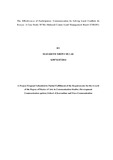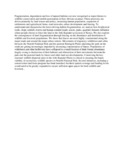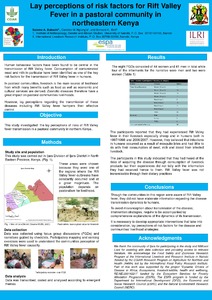Location
Our Vision is to be a world-class university committed to scholarly excellence.
Our Mission is to provide quality university education and training and to embody the aspirations of the Kenyan people and the global community through creation, preservation, integration, transmission and utilization of knowledge.
Core Values
In order to realize the above vision and mission, certain shared values shall be nurtured. There is great need for the University to be guided by the right values derived from the virtues and moral standards of the Kenyan and wider society.
Core Functions
Teaching and Learning: The university offers innovative , relevant and market driven academic programmes , both at undergraduate and postgraduate levels with inbuilt quality control systems the university also provides an environment and policy framework for undertaking high quality and relevant research
Members:
Resources
Displaying 46 - 50 of 298The Effectiveness of Participatory Communication in Solving Land Conflicts in Kenya: a Case Study of the Makueni County Land Management Board (Cmlbs)
The general objective of the studywas to determine the effectiveness of participatory communication in addressing land Conflicts among communities in Kenya, specifically in Makueni county.
Effects of extreme land fragmentation on wildlife and livestock population abundance and distribution
Fragmentation, degradation and loss of natural habitats are now recognised as major threats to wildlife conservation and mobile pastoralism in East African savannas. These processes are driven primarily by land tenure and policy, increasing human population, expansion of settlements and agricultural farms, road networks, urban development and fencing.
Value chain analysis of grass seeds in the drylands of Baringo county, Kenya: a producers’ perspective
Pastoral households are increasingly practising fodder production in response to forage scarcity associated with land degradation, climate variability and change. Understanding the grass seed value chain is a prerequisite for developing sustainable fodder production and guiding appropriate out-scaling in the drylands. This study investigated the producers’ perspectives on grass seed production, marketing and challenges faced along the grass seed value chain in Marigat Sub-County of Baringo County, Kenya.
Resolving Land Related Conflict In Kenya: The Role Of, AU Framework And Guidelines On Land Policy.
Land is measured to be very crucial to Africa’s profitable means of development, as the largest part of the populations depend on it for their wellbeing. Land disagreements are inevitable, since this is expected to occur while the population pursues their interests on land. This study examines the responsibility undertaken by the African Union framework and Guidelines on Land Policy (AU F&G) in the resolution of land associated conflicts in Kenya.
Lay perceptions of risk factors for Rift Valley fever in a pastoral community in northeastern Kenya
Consumption of contaminated livestock products is one of the risk factors for the transmission of Rift Valley fever (RVF) in humans. In pastoral communities, livestock is the main source of livelihood providing nutritional, economic and cultural services hence zoonotic diseases tend to be more prevalent in such communities. An understanding of the lay perceptions regarding the transmission of zoonoses can help institute effective interventions. A qualitative study was carried out in Ijara district in Kenya to investigate the lay perceptions of RVF transmission.






